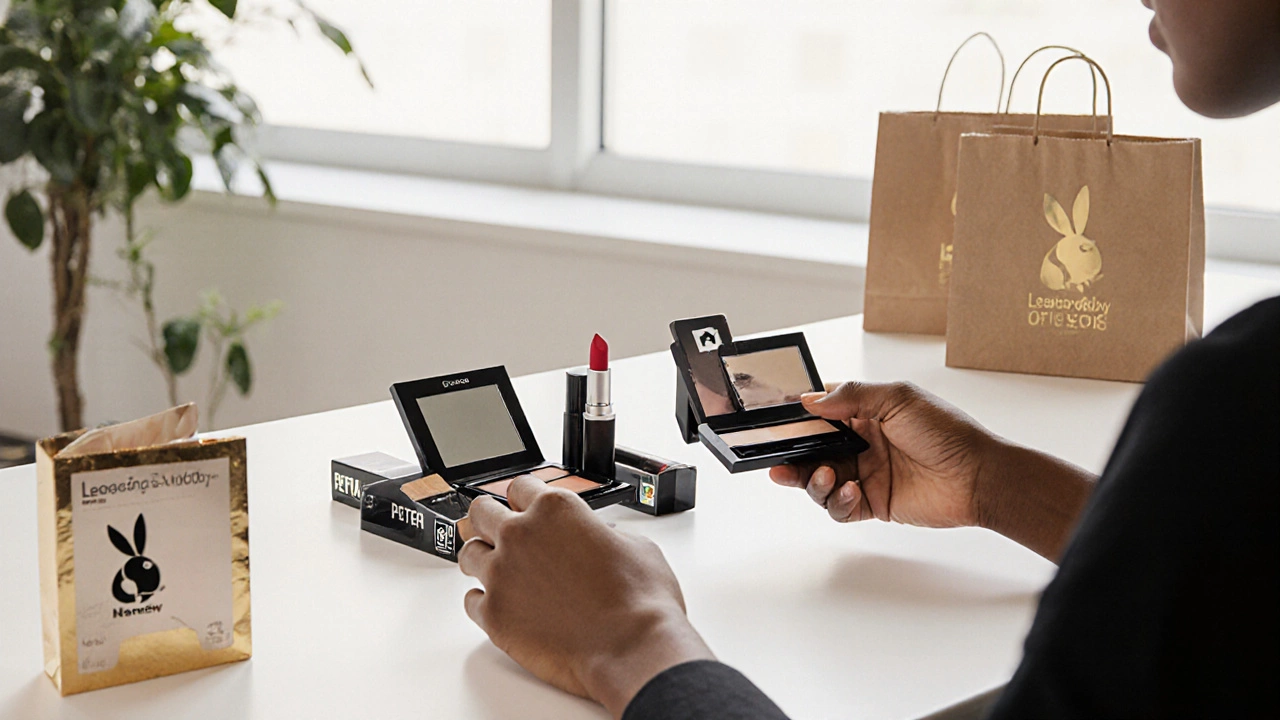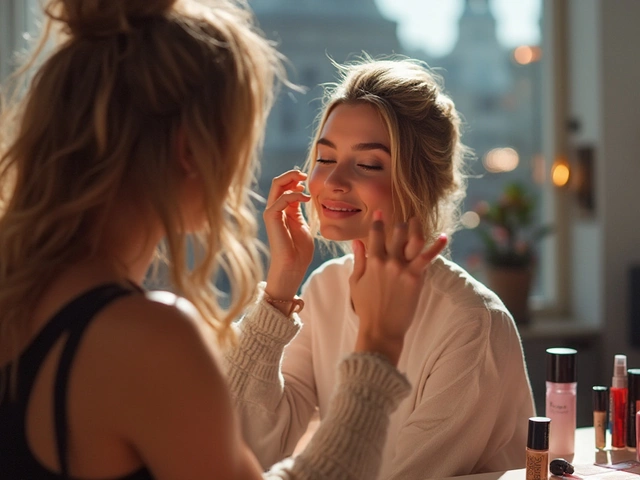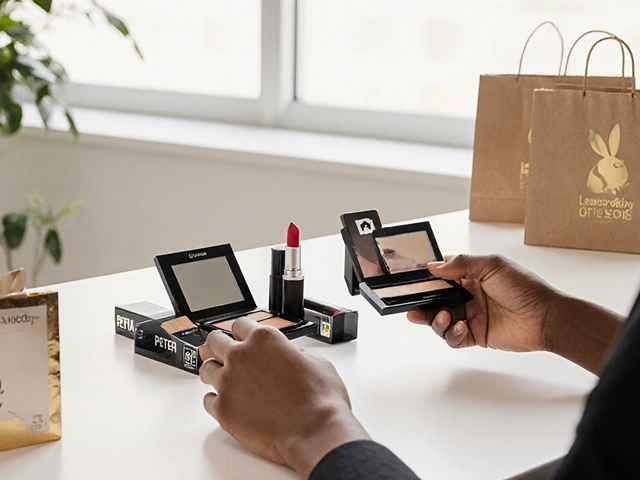It’s 2025, and more people than ever are asking: what makeup lines don’t test on animals? You’re not alone. If you’ve ever stared at a lipstick shelf wondering if that shiny pink shade cost a rabbit its eyes, you’re making the right choice by looking for cleaner options. The truth? Not all brands play fair. Some still force chemicals into rabbits’ eyes or skin. Others have gone completely animal-free - and they’re not just niche startups anymore. Big names, indie heroes, and global retailers all have options that never touch an animal.
How to Spot Real Cruelty-Free Makeup
Not every label says what it means. “Natural” doesn’t mean cruelty-free. “Green” doesn’t mean no animal testing. “Vegan” only means no animal ingredients - it says nothing about testing. You need to look for third-party certifications. The gold standard is the Leaping Bunny logo. It’s managed by the Coalition for Consumer Information on Cosmetics (CCIC), and brands have to prove they don’t test at any stage - not even through suppliers. No loopholes. No last-minute outsourcing. Another trusted mark is PETA’s Beauty Without Bunnies. It’s less strict than Leaping Bunny - some brands self-certify - but still reliable if you check their parent company. Avoid vague claims like “not tested on animals” unless they explain how they verify it. If they don’t, they might still be owned by a parent company that tests elsewhere.Top Cruelty-Free Makeup Brands You Can Trust
Here’s who’s actually walking the talk in 2025:- Urban Decay - A cult favorite since the 90s, they’ve been Leaping Bunny certified since 2014. Their Naked palettes are iconic, and they’ve never tested on animals, even when expanding into China.
- Fenty Beauty - Rihanna’s brand launched with 40 foundation shades and a zero-tolerance policy on animal testing. They’re certified by PETA and refuse to sell in markets that require animal testing.
- Too Faced - Known for cute packaging and bold colors, they’ve been Leaping Bunny certified since 2015. They even stopped selling in China in 2019 to protect their ethics.
- Hourglass - Luxury doesn’t mean compromise. Hourglass is Leaping Bunny certified, uses high-performance ingredients, and avoids animal testing globally.
- Milk Makeup - This New York brand is vegan, cruelty-free, and proud of it. Their Kush mascara and Lip + Cheek sticks are staples in zero-waste beauty routines.
- Dr. Hauschka - A German brand rooted in anthroposophic medicine, they’ve never tested on animals since 1967. Their mineral-based formulas are gentle and clinically tested using human volunteers.
- IT Cosmetics - Founded by a plastic surgeon, they focus on skincare-infused makeup. They’re Leaping Bunny certified and use alternative testing methods like reconstructed human skin models.
- Zuzu Luxe - A small, independent brand from New Zealand, they’re 100% vegan and cruelty-free, with packaging made from recycled materials. Their lipsticks come in rich, earthy tones perfect for everyday wear.
Brands That Say One Thing, Do Another
Some brands trick you with clever wording. They might say “we don’t test on animals,” but if they’re owned by a company that does - like L’Oréal, Estée Lauder, or Shiseido - then your purchase still supports animal testing. For example:- NYX - Owned by L’Oréal. While NYX itself doesn’t test, L’Oréal still tests on animals in China. So buying NYX indirectly funds animal testing.
- Too Faced - Was owned by Estée Lauder until 2021. They broke away to stay independent and keep their certification. That’s why their certification is valid now.
- Maybelline - Still sells in China, where animal testing is required by law. Even if they claim they don’t test, they pay for it to be done for them.
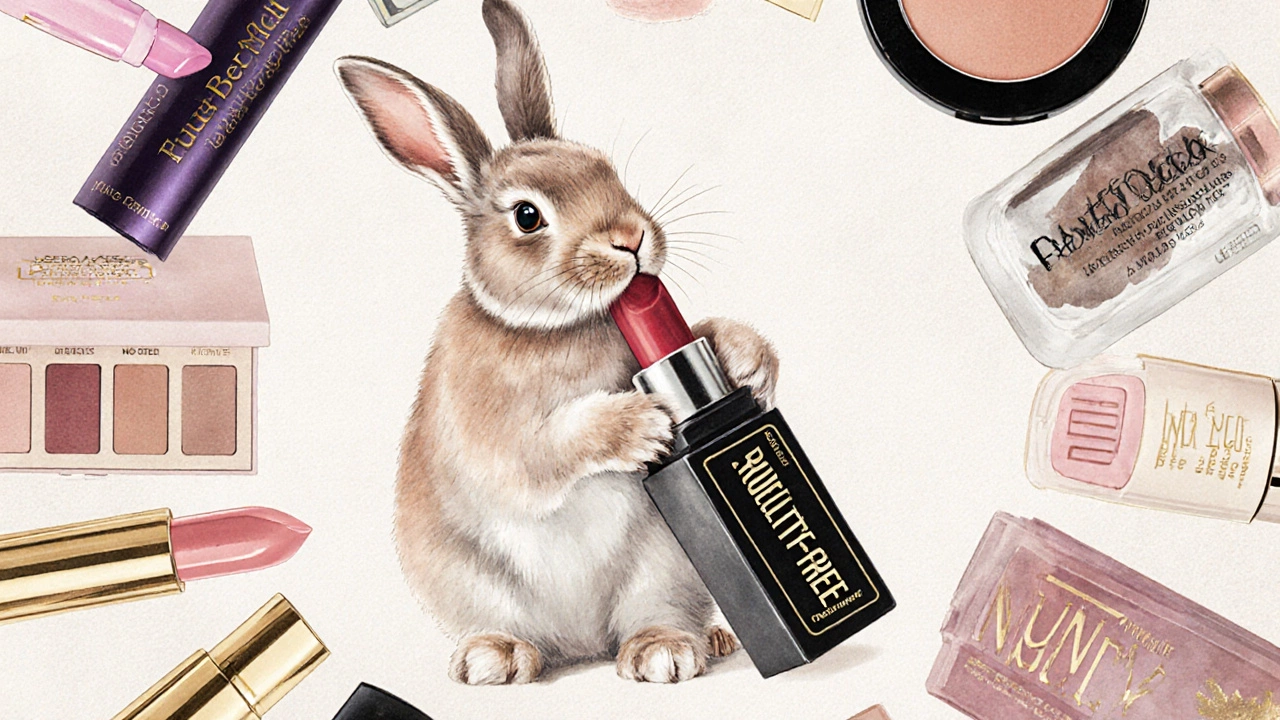
What About China? Can You Still Be Cruelty-Free There?
China used to force animal testing on all imported cosmetics. That changed in 2021 for general cosmetics - think lipstick, eyeshadow, foundation - if they’re made outside China and sold online. But if you buy in physical stores, or if the product is classified as “special use” (sunscreen, whitening, hair dye), testing is still required. That’s why brands like Fenty Beauty and Milk Makeup refuse to sell in physical stores in China. They won’t compromise. Others, like Benefit and Lush, sell online-only to stay cruelty-free. If a brand says they’re in China, ask: Are you selling in physical stores? If yes, they’re likely still funding animal testing.How to Check a Brand Yourself
You don’t need to trust a label. You can verify. Here’s how:- Go to leapingbunny.org - their list is updated monthly.
- Search the brand name. If it’s there, it’s certified.
- Check PETA’s database at peta.org - filter by “cruelty-free” and “makeup”.
- Look at the brand’s website. Do they have a clear, detailed animal testing policy? Or just a one-line claim?
- Search “brand name + animal testing” - if you see headlines about them selling in China or being owned by a tester, that’s your answer.
What Makes a Makeup Line Truly Cruelty-Free?
It’s not just about the final product. It’s the whole chain. A brand might test their lipstick, but if their pigment supplier tests on animals, it still counts. Leaping Bunny requires proof that every ingredient, every vendor, and every factory is clean. That’s why it’s harder to get certified than it looks. Also, cruelty-free doesn’t mean vegan. You can have a product with beeswax or carmine (crushed beetles) and still be cruelty-free. If you want both - no animal testing and no animal ingredients - look for the Vegan Society logo or “100% vegan” on the label.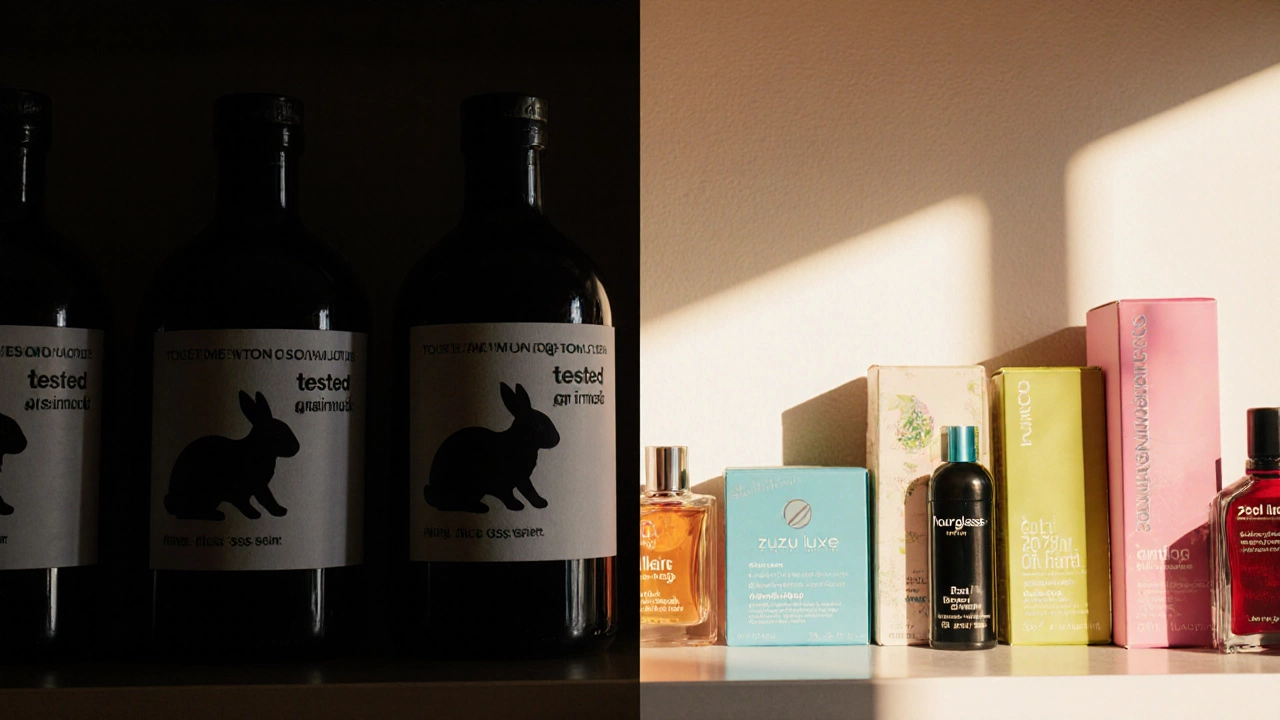
Why This Matters More Than Ever
In 2025, 43 countries have banned animal testing for cosmetics, including the EU, UK, India, Israel, and New Zealand. But the U.S. and Canada still allow it. That means if you’re buying from a U.S. brand that doesn’t disclose their testing policy, you could be supporting outdated practices. Every time you buy from a cruelty-free brand, you’re voting with your wallet. You’re telling companies: we don’t want pain for beauty. And it’s working. In 2024, over 1,200 new cruelty-free brands launched globally. The market for ethical makeup hit $18.7 billion - and it’s still growing.Where to Buy Cruelty-Free Makeup
You don’t need to shop online only. Major retailers like Target, Ulta, and Sephora have dedicated cruelty-free sections. Ulta even labels products with a “Cruelty-Free” badge. Look for the Leaping Bunny sticker on the box - it’s small, but it’s real. If you’re in New Zealand, check out Zuzu Luxe at local pharmacies or online at zuzuluxe.com. They’re made here, shipped globally, and never tested on animals.What to Do If You’ve Been Buying the Wrong Brands
Don’t panic. Don’t throw out your old makeup. Use it up. The goal isn’t perfection - it’s progress. Next time you run out, replace it with a certified brand. Start with one product: mascara, lipstick, or foundation. Then move to others. It’s easier than you think. You can also join online communities like r/crueltyfree on Reddit or follow Instagram accounts like @crueltyfreecupcake or @ethicalbeautyguide. They post weekly updates, new launches, and honest reviews.There’s no need to sacrifice color, performance, or quality to be kind. The best makeup doesn’t hurt anyone - not even the smallest creatures.
Are all vegan makeup brands cruelty-free?
No. Vegan means no animal ingredients - like beeswax, lanolin, or carmine. Cruelty-free means no animal testing. A product can be vegan but still tested on animals, or cruelty-free but contain animal-derived ingredients. If you want both, look for labels that say “vegan and cruelty-free” or check for the Vegan Society and Leaping Bunny logos together.
Does a brand have to be certified to be cruelty-free?
Not legally, but certification is the only way to be sure. Some brands claim they don’t test, but without third-party verification, they could still be owned by a parent company that does. Leaping Bunny and PETA’s list are the most trusted because they require full supply chain audits. If a brand isn’t on either list, treat their claim with caution.
Is there any cruelty-free makeup that’s affordable?
Yes. Brands like Elf Cosmetics, CoverGirl (owned by Coty, but certified by PETA), and Wet n Wild are all Leaping Bunny certified and priced under $15. You don’t need to spend a fortune to avoid animal testing. Many drugstore brands now offer ethical options without compromising on pigment or wear time.
Can I trust brands that say they’re “not tested on animals” on the packaging?
Not always. That phrase isn’t regulated. A brand could say that while still selling in China, where animal testing is required by law. Or they might test on animals for non-cosmetic products like shampoo. Always check their official website’s animal testing policy and see if they’re listed on Leaping Bunny or PETA. If you can’t find clear proof, assume it’s not reliable.
What’s the difference between cruelty-free and sustainable makeup?
Cruelty-free means no animal testing. Sustainable means the product has low environmental impact - think recyclable packaging, refillable containers, and ethically sourced ingredients. A brand can be one without the other. Zuzu Luxe is both. Some brands use plastic tubes with recycled content but still test on animals. Others use glass and aluminum but include carmine. Look for both certifications if you care about ethics and the planet.
Do any big beauty retailers sell only cruelty-free brands?
Ulta Beauty has a dedicated cruelty-free section and labels qualifying products. Target also carries many certified brands like Elf, Milk Makeup, and Fenty Beauty. Sephora has a filter for “cruelty-free” online, but not all in-store products are labeled. If you want to shop with confidence, stick to retailers that visibly label their products with Leaping Bunny or PETA logos.
Is there a list of cruelty-free makeup brands I can print out?
Yes. The Leaping Bunny website (leapingbunny.org) lets you download a PDF list of certified brands. PETA also offers a printable version of their Beauty Without Bunnies list. Keep it in your wallet or save it on your phone. That way, when you’re shopping, you can check instantly - no guesswork.
If you’re ready to make the switch, start today. Pick one product you use daily - maybe your foundation or lip color - and replace it with a certified cruelty-free option. You’ll feel better about what’s on your skin, and you’ll be part of the movement pushing beauty toward a kinder future.
